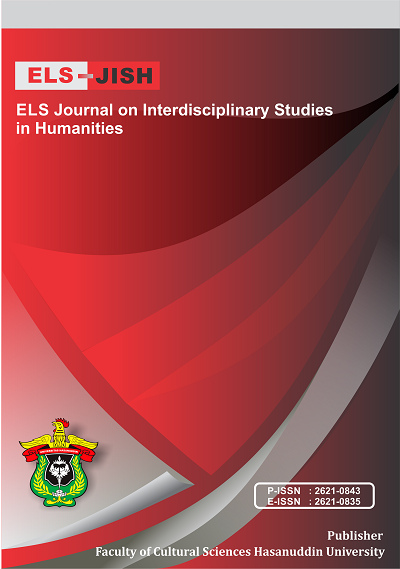Marvel Comics in The Context of Literary Tourism
DOI:
https://doi.org/10.34050/elsjish.v5i4.24825Keywords:
Literary Tourism, Marvel comics, Tourism DevelopmentAbstract
This study aims at discussing Marvel comics as a part of literary tourism. Marvel comics play an important role in supporting tourism development. The worldwide popularity of Marvel comics has also increased the popularity of the places that used as the setting in the comics. This study used literature review with a qualitative descriptive approach. The data is identified, classified and then interpreted based on a literary tourism and literary events. The results of the study shows that the representation of places in comic books can pique readers' interest in visiting those places. This popularity has an effect on rising tourism-related factors, monetary gains, state income, and the promotion of regional culture.
References
Babic, Annessa Ann. (2015). Wonder Woman as Patriotic Icon: The Amazon Princess for the Nation and Femininity. In Comics as History, Comics as Literature: Roles of the Comic Book in Scholarship, Society, and Entertainment, Cranbury: Fairleigh Dickinson University Press.
Bolan, P., & Williams, L. (2008). The Role of Image in Service Promotion. International Journal of Consumer Studies, 32(4), 382–390.
Botzakis, Stergios. (2009). Adult Fans of Comic Books: What They Get out of Reading. International Literacy Association and Wiley, Vol. 53.
Busby, G. & Shetliffe, E. (2013). Literary Tourism in Context: Byron and Newstead Abbey' European Journal of Tourism, Hospitality and Recreation 4(3) 5-45.
Charmaz, K. (2006). Constructing Grounded Theory: A Practical Guide through Qualitative Analysis, London, Sage.
Cooper, P. J., Collins, R., & Saxby, H. M. (1994). The power of story. Australia, AU: Macmillan Education.
Creswell, J. W. (2003). Research Design: Qualitative, Quantitative, and Mixed Methods Approaches (2nd edition). Thousand Oaks, CA: Sage Publications.
David, Peter. (2006). Writing for Comics with Peter David: North Light Books
Denzin, N. (2014). Interpretive Autoethnography, Thousand Oaks, Sage
Dittmer, Jason. (2009). “Captain America and Captain Britain: Geopolitical Identity And ‘the Special Relationship.’” In Captain America and the Struggle of the Superhero: Critical Essays, edited by Robert G. Weiner, 135–46. Jefferson: McFarland.
Duncan, Randy, & Matthew J. Smith. (2009). The Power of Comics: History, Form and Culture. London: Bloomsbury.
Dunne, G., Flanagan, S. & Buckley, J. (2011). Towards a decision making model for city break travel. International Journal of Culture, Tourism and Hospitality Research, 5(2) 158-172.
Flick, U. (2011). Introducing Research Methodology. A Beginner’s Guide to Doing a Research Project. London, UK: Sage Publications.
Foucault, M. (2014). Wrong-Doing, Truth-Telling, The Function of Avowal in Justice, Chicago, University of Chicago Press.
Herbert, D. (2001) Literary places, tourism and the heritage experience, Annals of Tourism Research, 28 (2) 312-333.
Keen, Suzzane. (2011). Fast Tracks to Narrative Empathy: Anthropomorphism and Dehumanization in Graphic Narratives. The Johns Hopkins University Press, 40 (2), 130-145.
Pearce, D. G. (2005). Tourist Behaviour: Themes and Conceptual Schemes. Clevedon, UK: Channel View Publications.
Permana, Bayu Galih. (2018). Gedung Ikonik Marvel dan DC Universe Ini Terinspirasi Bangunan Nyata. Hai-Online.com. 16 November 2018
Pitana, I. G., & Gayatri G., P. (2009). Sosiologi pariwisata [The sociology of tourism]. Yogyakarta: Penerbit Andi.
Putra, D. I. N. (2017). Pariwisata Sastra: Kombinasi kajian sastra dan kajian pariwisata [Literary tourism: A combination of literature and tourism studies]. Paper presenter at the Seminar Nasional pada Prodi Bahasa Inggris-FIB, Universitas Diponogoro. Semarang
Riessman, C. (1993). Narrative Analysis, Los Angeles & London, Sage.
Robinson, P., Heitmann, S., & Dieke, P. U. (2011). Research themes for tourism. Oxfordshire, UK: CAB International.
Susiati, S., Tenriawali, A. Y., Nursin, N., Nacikit, J., & Mukadar, S. (2020). Nilai Edukasi dalam Novel Partikel Karya Dewi Lestari:(The Value of Education in Particle Novels by Dewi Lestari). Uniqbu Journal of Social Sciences, 1(3), 176-183.
Watson, N. (2006) The Literary Tourist, Basingstoke, Palgrave Macmillan.
Downloads
Published
How to Cite
Issue
Section
License
Copyright (c) 2022 Mamik Tri Wedawati, Nur Chakim, Fithriyah Inda Nur Abida

This work is licensed under a Creative Commons Attribution-NonCommercial-ShareAlike 4.0 International License.






